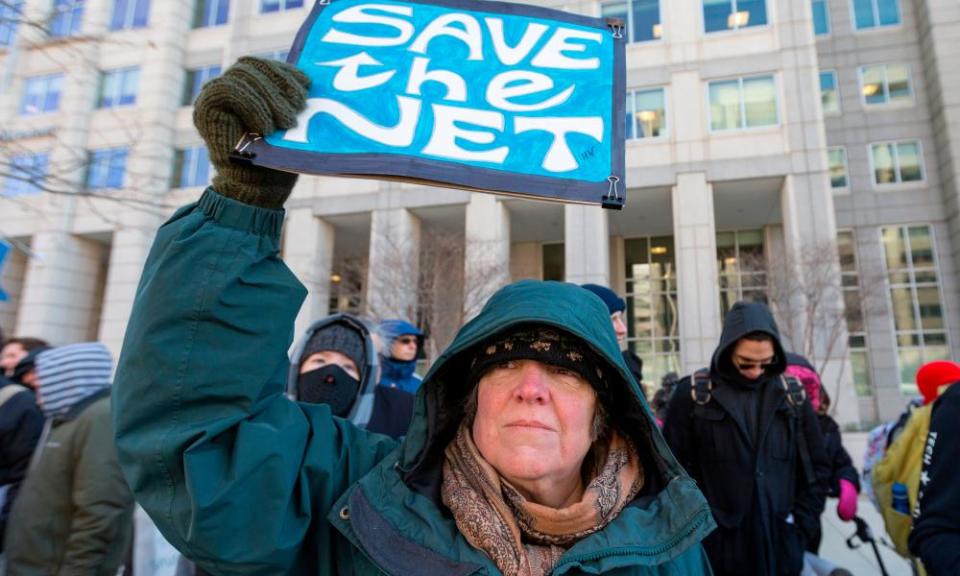US regulator scraps net neutrality rules that protect open internet

The US’s top media regulator voted to end rules protecting an open internet on Thursday, a move critics warn will hand control of the future of the web to cable and telecoms companies.
At a packed meeting of the Federal Communications Commission (FCC) in Washington, the watchdog’s commissioners voted three to two to dismantle the “net neutrality” rules that prevent internet service providers (ISPs) from charging websites more for delivering certain services or blocking others should they, for example, compete with services the cable company also offers.
Outside, protesters angrily called on Congress to block the FCC’s efforts. Bouquets of flowers littered the grass outside the building, an apparent reference to the “death” of open internet. Posters of the angry-face emoji covered the walkway.
And activists carried hand-made signs that read: “Don’t make the internet a private toll road”; “Ajit Pai doesn’t want you to meet your fiancé online”; and “Don’t undermine our democracy – that’s Russia’s job”.
The meeting was briefly interrupted by a security threat.
Hey hey @AjitPaiFCC: we are out here at the biggest rally this building has ever seen and ready to fight for #NetNeutrality pic.twitter.com/xpzAGzBldE
— Free Press (@freepress) December 14, 2017
FCC commissioner Mignon Clyburn, a Democrat, denounced the move. “I dissent because I am among the millions outraged, outraged because the FCC pulls its own teeth, abdicating responsibility to to protect the nation’s broadband consumers,” she said.
Fellow Democratic commissioner Jessica Rosenworcel said the FCC had shown “contempt” for public opinion during the review. She called the process “corrupt”. “As a result of today’s misguided actions, our broadband providers will get extraordinary new powers,” she said.
But FCC chair Ajit Pai and his two fellow Republicans voted for the repeal. Pai said the current rules had impeded innovation and addressed non-existent concerns. “We are restoring the light-touch framework that has governed the internet for much of its existence.” He called claims that the move would kill the internet “outlandish”.
Net neutrality’s advocates argue that an open internet has been essential to the creation of today’s web, and has allowed companies like Skype to compete with telecoms providers and Netflix to change the media landscape. They say the removal of the rules will affect consumers worldwide.
Cable companies have attempted to block or slow competing services in the past, and the rules were meant to prevent such cases arising in future. Removing the rules, critics argue, will stifle the online innovations that have been enjoyed by people worldwide and set a dangerous precedent for other countries looking to take firmer control of the internet or to hand oversight to corporations.
Evan Greer, campaign director for internet activists Fight for the Future, said: “Killing net neutrality in the US will impact internet users all over the world. So many of the best ideas will be lost, squashed by the largest corporations at the expense of the global internet-using public.”
Michael Cheah of Vimeo said: “ISPs probably won’t immediately begin blocking content outright, given the uproar that this would provoke. What’s more likely is a transition to a pay-for-play business model that will ultimately stifle startups and innovation, and lead to higher prices and less choice for consumers.”
Passing the plan is a major victory for Pai, a Donald Trump appointee and former Verizon lawyer who has been a long-term critic of the net neutrality rules brought in under Barack Obama in 2015.
The FCC will require internet providers to disclose how they treat traffic, but regulation of the internet will essentially move to the Federal Trade Commission (FTC), removing barriers to potential abuses and leaving the FTC to assess violations after the fact.
Cable companies have dismissed critics’ concerns and said they remain committed to an open internet.
“This is not the end of net neutrality,” Comcast’s senior executive vice-president wrote in a blogpost. “Despite repeated distortions and biased information, our internet service is not going to change. Comcast customers will continue to enjoy all of the benefits of an open internet today, tomorrow, and in the future. Period.”
But critics charge that as cable companies become ever bigger investors in media (Comcast owns NBC Universal, and AT&T is trying to buy Time Warner) the incentives to hamper competition are increasing.
Pai’s proposal still faces heavy opposition. A record 22 million comments were submitted to the FCC by the general public before the vote – the majority in favor of keeping the rules.
Millions of comments submitted in support of Pai’s decision were found to be fake and are now being investigated by New York attorney general Eric Schneiderman.
On Wednesday morning, two US senators, Susan Collins and Angus King, both of Maine, called on the FCC to cancel the vote. “Repealing the FCC’s net neutrality rules will undermine long-standing protections that that have ensured the open internet as a powerful and transformative platform of innovation and economic opportunity,” they wrote.
Eighteen attorneys general, dozens of Democratic congressmen and two Republicans had pushed for a delay to the ruling. Critics and activists will now push for Congress to step in and pass a resolution of disapproval using the Congressional Review Act to overturn the FCC’s order.
The FCC is also likely to face a legal challenge to the order, which has been attacked by internet companies including Etsy, Bittorrent, Netflix, Pinterest, Pornhub, Spotify and Wikipedia.
Passing the vote is just the latest in a series of controversial moves made by Pai in his 11-month tenure. The FCC has also relaxed local media ownership rules, potentially ushering in a wave of consolidation, cut a high-speed internet internet scheme for low-income families and allowed broadband providers to raise rates for businesses.

 Yahoo Finance
Yahoo Finance 